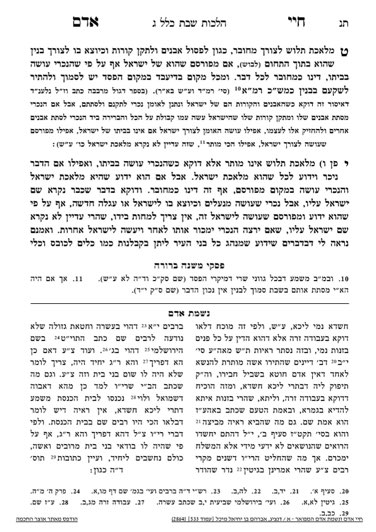We are continuing in siman 10, discussing the sixth criterion for it to be permitted to make an arrangement with a non-Jew before Shabbos regarding melacha on Shabbos. This criterion is that even when an item is talush, the non-Jew cannot perform the work on the item in a public place.
The Chayei Adam explains that the heter for the non-Jew to perform work on a talush item is specifically when the work is done in the home of the non-Jew or a similar private place belonging to the non-Jew. It is assur for the work to take place in the Jew’s house. The concern, as we discussed yesterday, is maris ayin. Even though the arrangement between the Jew and the non-Jew is that of a kablan (because if it were of a sechir yom it would be assur inherently, as we have discussed previously), if people see the non-Jew working in the Jew’s house, they will think that the Jew made the arrangement with the non-Jew on Shabbos itself, which is assur even in a kablan arrangement.
When the Mishnah Berurah brings down this point, he adds that when a non-Jew lives in the home of a Jew, even things which she does for herself are problematic, because it may be mistaken as being done for her employer based on a request made on Shabbos itself. However, things which are obviously for herself do not have this issue, because we are not concerned that people will think she is doing the work for her employer. Thus, for example, sewing clothing for herself is a problem, because people will think she is sewing the clothing for her employer. However, if it is a type of clothing which obviously belongs to a non-Jew, we no longer have our concern so she could perform the work.
Later, in siman 26, the Chayei Adam discusses a non-Jew working in a mill while his Jewish contractor is present. Although it is not exactly identical to our case, we have a similar concern in that the fact the Jew is present creates a concern that people will think the Jew asked the non-Jew on Shabbos to perform the work.
In the brackets, the Chayei Adam adds another point. He writes that even in a scenario in which a non-Jew is hired through kablanus, if the Jew is present, the Jew should protest and ask the non-Jew not to work on Shabbos. Even if the non-Jew will not stop, the Jew should still register a protest. In certain scenarios, he may even be obligated to offer him money, as we have discussed. Thus, if the Jew must protest, obviously he may not allow the work to take place in his own home.
Summary
- If one instructs a non-Jew before Shabbos, there are times when it will be muttar, depending on eight conditions.
- The sixth condition is that even if the item is talush, it must not be worked on in public, due to a concern of maris ayin. The work must be done in the non-Jew’s home or similar private place.
- If the non-Jew still owns the rights to the item (e.g., he was commissioned by the Jew and is still creating the item), he may work on it in public.
- The work certainly cannot take place in the home of the Jew.
- Thus, non-Jewish live-in help cannot do work, even for themselves, which may appear to be for the Jewish employer. If it is work which is clearly for themselves, they may do the work.



